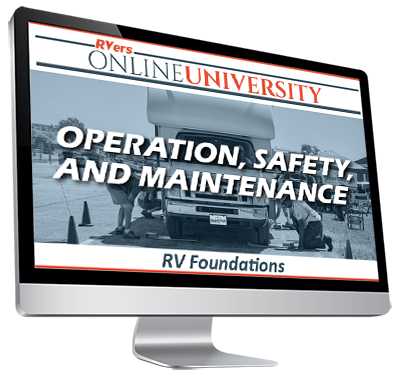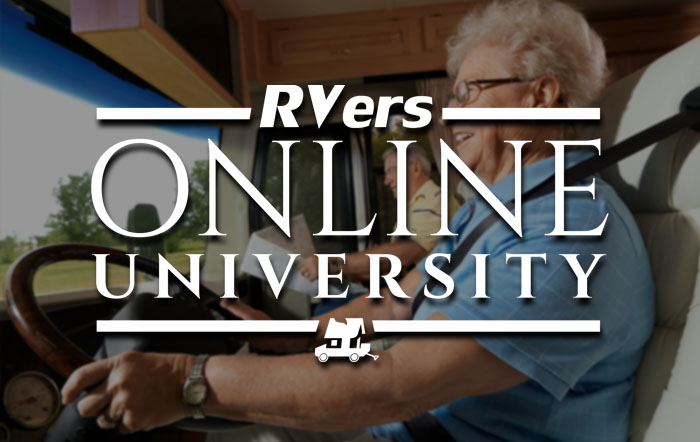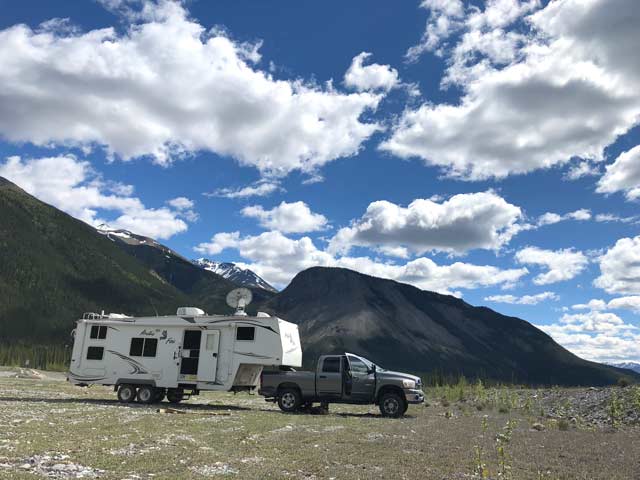
Full-time RVing before retirement can scratch that wanderlust itch in your heart. But a wise traveler doesn’t take the leap without understanding the risks, rewards and challenges of working and traveling. From getting work, to managing Internet challenges and actually enjoying the lifestyle, here are some top ways for making the most of the nomadic life.
The Rewards and Drawbacks of Full-Time RVing Before Retirement
Watching young friends die was the wake up call we needed to turn our lives upside down. Before we were 40, we watched cancer take the lives of two friends who didn’t make it to retirement. Another died of alcohol poisoning. I almost died in a motorcycle wreck. And when our dog received a terminal cancer diagnosis, it was the proverbial straw that got us to take action.
The year was 2007 and we knew it was time to embark on a major lifestyle shift. We sold our home and business to start full-time RVing at the ages of 38 and 40. Before we knew it, our one-year road trip became fourteen and today there’s no end in sight.
Since we’re not monetarily rich, we must get crafty to earn money. This isn’t always easy or fun. Over the last twelve years we’ve faced three of the most common challenges of working and traveling, such as:
Finding Enjoyable Work That Pays the Bills on Time
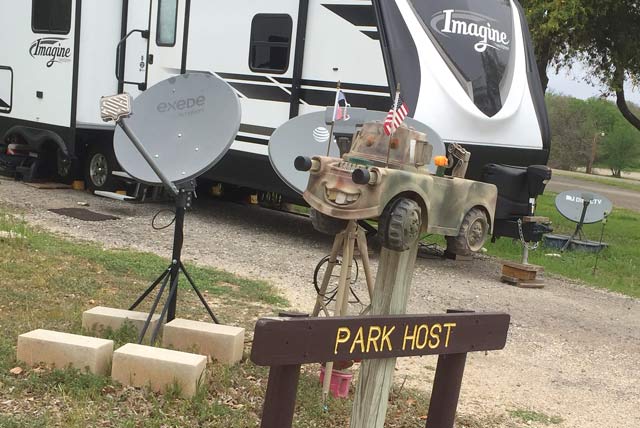
In many RV parks and campgrounds, you’ll find people like my husband and I who aren’t waiting until our senior years to enjoy the traveling lifestyle. We all make it work by earning money in a number of different jobs for RV nomads. Some of us run our own businesses. Many teach online courses. Lots of travelers take on temporary seasonal workamping roles like campground hosting and seasonal warehouse fulfillment. And a growing number of younger full-timers are long-term W2 employees earning paychecks as company programmers, graphic designers, website designers, sales reps and more, choosing to continue their career from the road. In many cases, all you need is a laptop and internet!
The type of work you can do from anywhere is endless and growing every year. But, like any work situation, there is no perfect way to make money when you travel.
When aspiring full-time RVers need to earn money and want to know “the best jobs for full-time RVers?” we tell them the hard truth: pros and cons exist no matter which way you decide to make money. Even worse, as a full-time RVer it may take several tries before you find the kind of work that makes you happy and pays your bills. Here are some things to consider along the way:
Pros and Cons of Workamping
- Workampers enjoy a low commitment job obligation, usually with an end in sight.
- But while trading your time for a campsite may save you money on rent, workamping is not going to provide the kind of income that allows you to save for the future. Many workampers earn low wages doing jobs that are repetitious, strenuous or gritty.
Pros and Cons of Running Your Own Business
- Being self-employed gives you the joy of being your own boss and making your own rules.
- But keeping the work flowing is a never-ending task, you’ll work long hours, probably invest more money to get started than you expected, and your business efforts could flop regardless.
Pros and Cons of Working Remotely
- If you land a remote job with an employer, you can enjoy a level of freedom you never expected while still reaping the benefits of a regular paycheck.
- But being out-of-sight can translate to being out-of-mind within your company. Many remote employees say working at home is lonely. They also feel like they’re missing out on important water cooler chatter that affects them.
The Trial and Error Journey of Working from the Road
Plenty of resources exist to help nomads perfect their income generation strategy. If and when you do find that perfect job or business that works for you, it may or may not provide a salary that pays the bills and helps you save for the future. Many working full-time RVers go on a trial-and-error journey of finding that one job that best suits their personality, skills and goals. For instance, my husband and I needed about three years before we found our way to a more stable income. Along the way we had to live off our savings account. But with lower living costs as full-time RVers, income uncertainty wasn’t as terrifying as the days when we had a mortgage payment and heaps of credit card debt.
You may find your ideal income source in less time than we did, but if you want to enjoy the freedom of the road while doing it, do everything you can to build a healthy emergency savings fund. Experts recommend keeping a minimum of eight months of living expenses in liquid funds. Building an emergency fund isn’t easy, but once established it provides breathing room if you need to quit a job or end a business that doesn’t work for your new lifestyle.
Getting Online (And Paying For It) Is An Ongoing Struggle

Internet connectivity is as predictable as tap water when you live in a sticks-and-bricks home. But once you pull out of the driveway for good and take your work on the road, you’re in for a rude awakening. In the full-time RVing lifestyle, getting online is nowhere as easy.
To be fair, connecting to the Internet has improved over the last decade and thankfully so. Living without the web is just not an option anymore for full-time RVers who work from the road. Unfortunately, this freedom on the road is mostly limited to the strongest cellular broadband connection along our routes. Every working-age full-timer I’ve met almost always says that connecting to the Internet is their biggest work-related challenge.
The second part of the Internet challenge is the actual cost of getting online. Mobile broadband data plans are far more expensive than land-based service. Once you hit the road you can expect your monthly data and cellular phone costs to rise. This lifestyle makes you acutely aware of how much data you are eating up by streaming movies, downloading photos and video conferencing with colleagues, friends and family.
The solution to these online challenges is based on your budget and your technical know-how. For example:
Novice Internet Users Can Use Their Cell Phones To Get Online
Use it to connect at public WiFi hot spots or buy a data plan with your cellular provider. Even when you’re in the middle of nowhere boondocking, you can usually run into town to find WiFi and get a few things done online. If you don’t need the Internet for daily work but merely to check email and look for jobs, cellular hotspots are the least expensive and easiest way to get online when the planets align and internet access conditions are ideal.
Intermediate Level Internet Users Who Require Daily Activity Benefit From Extra Technology
To boost the odds of connectivity success, investing in must-have mobile Internet gear like hotspots and cellular signal boosters is a wise idea. Although this still places a user at the mercy of cellular towers along their routes, getting online is less of a challenge. Even novice users can learn how to use these tools thanks to groups like the Mobile Internet Resource Center, which offers educational resources to keep the data flowing.
High Level Technically Savvy Internet Users Will Pay The Most for Guaranteed Access
If you’re like us and must babysit your businesses on a daily basis, investing in a RV satellite Internet system is the only way to guarantee Internet access. It’s not cheap and is sometimes fussy to use, but having our own DataSat 840 system by Mobilsat was how we were able to journey to Alaska and run our business in almost exactly the same way. It’s the only surefire method to get online anywhere in North America with a clear view of the southern sky.
Balancing Work, Play and an Ever-Changing Lifestyle Requires Commitment
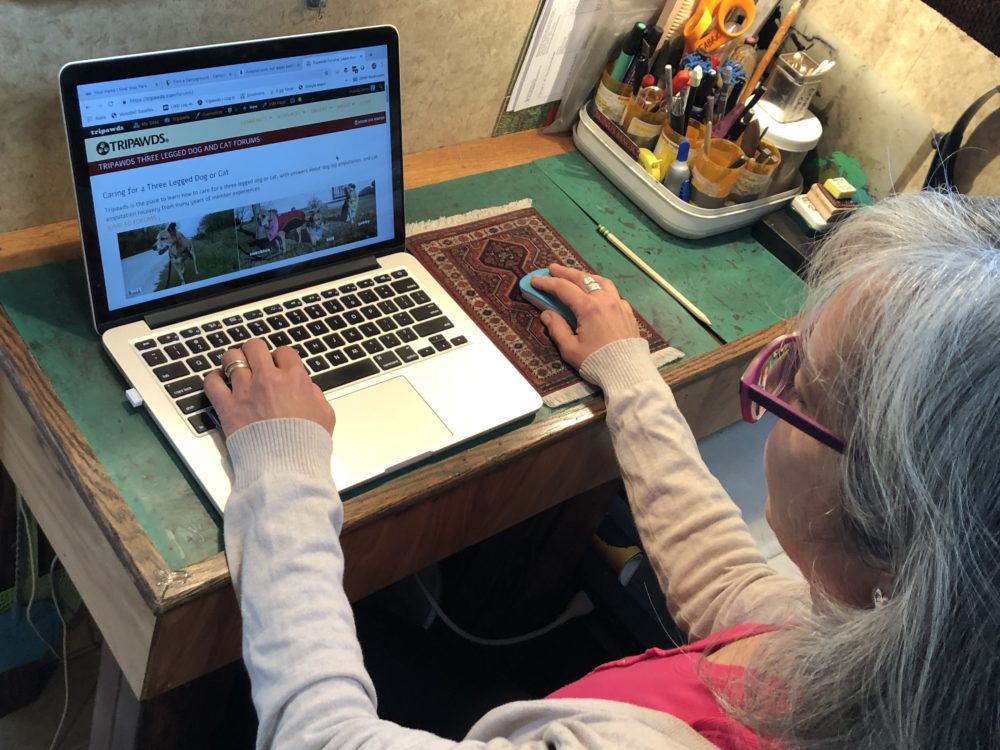
Yes, full-time RVing is often as good as it looks on social media. You’ll play in bucket-list destinations, drive cross country on a whim to see friends and family or just soak up the tranquility of nature whenever you please – over and over again. But doing it while staying focused on work is hard when nature is showing off just steps away from your front door. Finding time to squeeze it all in takes a deep commitment to your goal of earning money on the road. Here’s how we do it:
Travel Only Happens On Non-Work Days
We also keep our driving days short. This enables us to fit in leisure time once we arrive at our destination and enjoy a day off from work.
Work Days Are As Routine As Anyone Else’s
Sticking to set work hours is one of the few predictable circumstances in our nomadic life. This stability helps our work flow remain constant and allows us to stay on track with income goals.
We Set Boundaries When We Visit Friends and Family
People living conventional lives and working in routine jobs rarely understand what it takes to keep this lifestyle going.
Jim and I often hear “You work too much!” from friends and family we visit. What they don’t get is that we are working about the same amount of hours as anyone with a traditional employment arrangement! We have to set them straight by reminding them we are not on vacation and typically plan get-togethers after the work day is done.
With Determination, You Can Survive the Challenges of Working On The Road
As you can see, full-timing is great and can work for anyone with a strong commitment to living and working in an offbeat way. As long as you stay focused on the big picture, it gets easier to find the right balance that keeps your boss, customers, clients, friends and bank accounts happy.
Whether you decide to work for others or for yourself, your time in the salt mine is what puts gas in your tank and allows you to enjoy a lifestyle most people are too afraid to try before retirement. Stick to it and pretty soon you will inspire others to do the same.

Author
Rene Agredano
Rene and Jim are enjoying their 14th year as full-time RVers and location-independent entrepreneurs. Follow their travels at LiveWorkDream.com.
Did you like this post? Pin it on Pinterest!


